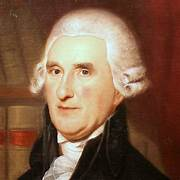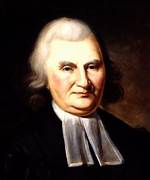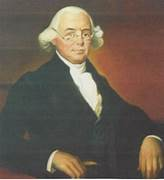By Catherine McKinley
As the citizens of the United States of America prepare to celebrate the 4th of July, it should be noted that the signers of the Declaration of Independence, while mostly from England, included three Scots: Colonel Thomas McKean, Reverend John Witherspoon, and Judge James Wilson.

Colonel Thomas McKean was born in New London, Pennsylvania to Scotch-Irish parents who had emigrated to the American colonies before his birth. Like numerous children at the time, he was largely educated at home. However, when he was nine, he was sent to study at the New London Academy in the Delaware colony. He had a prolific political and professional career. In 1957, he joined the colonial army “company of foot” eventually achieving the rank of colonel. He was elected to the Delaware General Assembly in 1762, also serving, simultaneously, since 1774, in the First Continental Congress. Then, in 1777, he became Speaker of the Delaware General Assembly and Chief Justice of the Pennsylvania Supreme Court. Later, in 1799, he was elected Governor of Pennsylvania. Thomas McKean was married twice and fathered 10 children.

Reverend John Witherspoon
Rev. Witherspoon was born in 1723 in Gifford East, Lothian, Scotland. After completing Theology studies at the University of Edinburgh, he was called to the parish at Beith. Later, in 1757, he became pastor at Paisley. He, then, emigrated to “the colonies” to accept the presidency of the College of New Jersey. He was drawn to the campaign for Independence and served in two provincial congresses before becoming a delegate to the Continental Congress in the pivotal year of 1776. He was a persuasive advocate, and signer of, the Declaration of Independence.

Judge James Wilson was born in Carskerdo, Scotland in 1742.
His educational journey included stints at the University of St. Andrews in Glasgow, and in Edinburgh. In 1766, he relocated to “the colonies” to accept a teaching position at Philadelphia College. There, he, also, continued preparing for admission to the Pennsylvania Bar to which he was admitted in 1767. In 1774, James Wilson was elected a member of the Committee of Correspondence (emergency provisional government). While in that position, he wrote a widely distributed pamphlet in which he argued that the British Parliament had no authority over the English Colonies. He was elected to the Continental Congress in 1775. He was a member of the Pennsylvania Delegation, along with Benjamin Franklin and his law school mentor, John Dickinson which was, initially, divided on the motion for separation from England. After gathering feedback from his constituents, Judge Wilson cast his vote for Independence.
In the hit Broadway Stage Show/Movie “1776,” only Colonel McKean’s character has a strong Scottish brogue. While not completely historically accurate, I recommend watching it.

